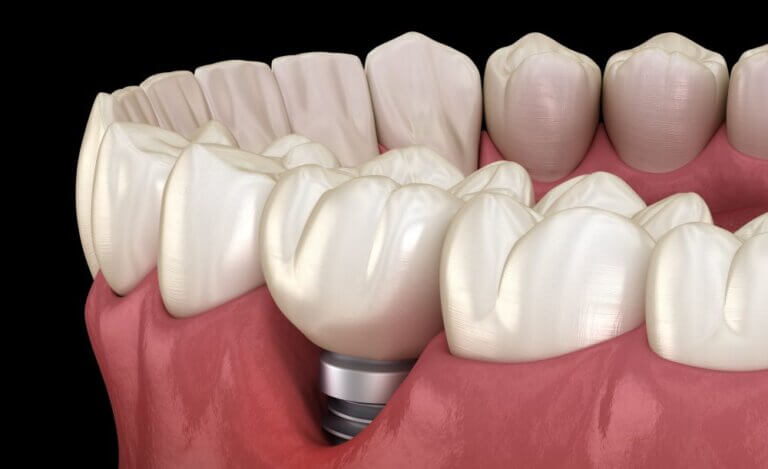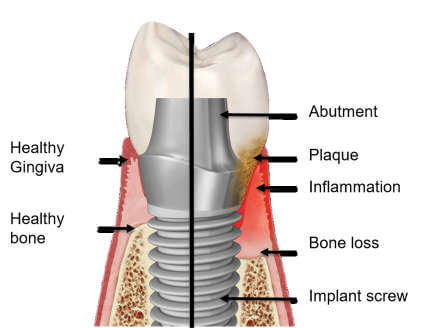Dental Implant Failure

What Is Dental Implant Failure?
Dental implants have become a trusted solution for replacing missing teeth, providing a solid foundation for crowns and bridges. While these implants boast a high success rate, they are not immune to failure. Dental implant failure occurs when an implant does not properly integrate with the jawbone or experiences complications that jeopardize its stability. This can lead to discomfort, pain, and the potential loss of the implant itself. If you suspect you are experiencing dental implant failure, there are some things you should know as a patient:
- Common Causes of Dental Implant Failure
- Signs And Symptoms Of Dental Implant Failure
- Treatment Options For Dental Implant Failure
- Managing Dental Implant Failure Until You Can See The Dentist
- Frequently Asked Questions About Dental Implant Failure
If you have questions about Dental Implant Failure or other dental problems, please contact us for more information.
Common Causes of Dental Implant Failure
Understanding the reasons behind dental implant failure can help you take preventive measures. Here are the most prevalent causes:
- Poor Oral Hygiene: Inadequate oral care can result in infections and peri-implantitis, jeopardizing the success of your implant. Maintaining a rigorous oral hygiene routine is vital.
- Implant Design and Placement: The design, size, and positioning of the implant significantly influence its stability. Improper placement can create mechanical stress, increasing the risk of failure.
- Surgical Technique: The skill of the dental surgeon plays a crucial role. Inexperienced handling or poor surgical practices can compromise the implant’s integrity.
- Underlying Medical Conditions: Chronic conditions like uncontrolled diabetes, osteoporosis, and autoimmune diseases can hinder healing and increase failure risk. Always disclose your medical history to your dentist before the procedure.
- Smoking: Smoking impairs the healing process and raises the likelihood of infection. Quitting smoking before and after implant surgery is strongly advised.
- Alcohol Consumption: Excessive alcohol can hinder healing and increase infection risk. Limiting alcohol intake is essential for successful recovery.
By understanding these factors, you can take proactive steps to mitigate the risks of dental implant failure. If you have questions about the causes of Dental Implant Failure, please contact us for more information.

Signs And Symptoms Of Dental Implant Failure
While dental implant failure is uncommon, being aware of potential warning signs is essential. Key symptoms include:
- Persistent Pain or Discomfort: Pain around the implant site, particularly during chewing, can indicate underlying issues, such as infection or bone loss.
- Mobility: A properly placed implant should not move. If you notice any looseness, it may signal failure.
- Peri-implantitis: This infection manifests as inflammation, redness, and pus discharge around the implant. Symptoms may also include bad breath and fever.
- Gum Recession: Receding gums can expose the implant and compromise stability, potentially leading to failure.
- Bite Changes: Alterations in bite or discomfort during chewing could indicate positioning issues with the implant.
If you experience any of these symptoms, consult your dentist immediately for an evaluation. For more information about signs and symptoms of Dental Implant Failure, please contact us.

Treatment Options For Dental Implant Failure
If you face dental implant failure, your dentist may suggest various treatment options based on the cause and severity:
Implant Removal: In cases of severe infection or mechanical failure, the implant may need to be removed (explantation). The area will be cleaned, and a bone graft or new implant may be placed if appropriate.
Bone Grafting: If bone loss has occurred, a bone graft may be necessary to restore the structure and support a new implant.
Immediate Implant Placement: In some cases, a new implant can be placed right after the removal of a failed implant if sufficient bone support is available. If not, bone grafting may be required before reattempting implant surgery.
Early intervention is crucial for increasing the chances of success and minimizing complications. If you have questions about treatment options related to Dental Implant Failure, please contact us for more information.
Managing Dental Implant Failure Until You Can See The Dentist
If you suspect dental implant failure but cannot see your dentist right away, consider these temporary management strategies:
- Maintain Cleanliness: Gently clean the area around the implant with antibacterial mouthwash such as Crest Gum Care Mouthwash. Consider using gum care toothpaste like Crest Pro Health Gum Detoxify and a Waterpik water flosser for optimal care.
- Avoid Chewing on the Affected Side: Minimize pressure on the area to prevent further damage.
- Cold Compress: Apply a cold compress to reduce swelling and discomfort.
- Over-the-Counter Pain Relief: Ibuprofen (Advil) or acetaminophen (Tylenol) can alleviate temporary pain. Consult your dentist for appropriate dosing.
- Soft Diet: Stick to soft foods like soups and yogurt to avoid irritating the implant site.
These measures are only temporary; seeing your dentist as soon as possible is essential for addressing the underlying issue. For more information about how to manage Dental Implant Failure, please contact us.
Frequently Asked Questions About Dental Implant Failure
- How can I reduce the risk of dental implant failure?
Maintain good oral hygiene, follow your dentist’s post-operative care instructions, avoid smoking and excessive alcohol consumption, and manage underlying health conditions effectively.
- What should I do if I suspect my dental implant is failing?
Contact your dentist immediately for an evaluation. Early intervention can improve the chances of saving the implant.
- Can a failed dental implant be replaced?
Yes, in many cases, a failed dental implant can be removed, the site can be treated with a bone graft, and a new implant can be placed after sufficient healing time.
- Is dental implant failure common?
No, dental implant failure is rare, with success rates typically exceeding 95%. Failures are often associated with specific risk factors like smoking or poor oral hygiene.
- Can peri-implantitis lead to implant failure?
Yes, peri-implantitis, an infection that causes inflammation and bone loss around the implant, is a common cause of late-stage dental implant failure. Prompt treatment can help save the implant.
Dental implant failure is rare but can occur due to various factors, including poor oral hygiene or health conditions. Early intervention and regular dental care are key to addressing issues and ensuring long-term success for your dental implants. For more information about how to manage Dental Implant Failure, please contact us.

